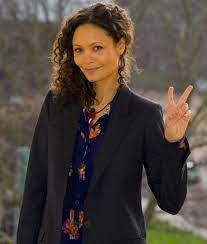
Thandiwe Newton
By Tapfuma Machakaire 13/11/2022
Racism has had such a debilitating effect on a leading actress of colour in the United Kingdom who says her source of inspiration and solace is watching her mother dressed in her traditional African garb.
Thandiwe Newton’s father is a white Briton while the mother is a black Zimbabwean. She was born in London but her family settled in Penzance, Cornwall, when Thandiwe was three years old.
Commenting about her childhood at a Technology Entertainment and Design (TED) news conference Thandiwe said “From about the age of 5, I was aware that I didn’t fit. I was the black, atheist kid in the all-white, Catholic school run by nuns. I was an anomaly.”
Melanie Thandiwe Newton was born in London on November 6, 1972. Her mother Nyasha Jombe, a granddaughter of a traditional chief in Zimbabwe, is a health-care worker while her father is Nick Newton, a British laboratory technician and artist. She says in some biographies, her country of birth is wrongly captured as Zambia, although she has confirmed in interviews that she was born in London.
Thandiwe says she was christened Thandie by the nuns distorting her African name Thandiwe which in the Ndebele language means beloved.
In a story carried by the BBC in April 2021 she announced that she was reverting to the original spelling of her name Thandiwe. The name Tandie had been used on credits of the several British and American films she featured in.
Thandiwe studied dance at theTring Park School for the Performing Arts, UK’s leading performing arts and academic school which caters for young people aged between seven and 19 years. At age 16 while still recovering from a back injury, she successfully auditioned for her first film role. She made her film debut in the Australian comedy drama- Flirting, in 1991. She went on to study social anthropology at Downing College, Cambridge, from 1992 to 1995.
Thandiwe has appeared in a number of British and American films, including The Pursuit of Happyness, Mission: Impossible II, Crash, Run Fatboy Run, and For Colored Girls. For Colored Girls is a 2010 American drama film adapted from Ntozake Shange’s 1975 original chore poem for colored girls who have considered suicide.
Thandiwe gained international recognition in the Merchant Ivory production of Jefferson in Paris. The drama film is a semi-fictional account of Thomas Jefferson’s tenure as the Ambassador of the United States to France before his presidency and of his alleged relationships with British artist Maria Cosway and his slave. Thandiwe played the character of Sally Hemings the slave. She subsequently appeared in the 1998 Jonathan Demme’s Beloved in which she played the title character with co-stars Oprah Winfrey and Danny Glover. Thandiwe also played the female lead Nyah Hall in the film Mission: Impossible II.
Between 2003 and 2005 she played Makemba “Kem” Likasu, the love interest, and later wife of Dr. John Carter on the American television series ER.
Thandiwe portrayed U.S. National Security Advisor-turned Secretary of State Condoleezza Rice, in film biography of President George W. Bush released in October 2008.
She later played the US President’s First Daughter Laura Wilson in 2012. Thandiwe is a character who can be full of surprises. In 2007, she sold her near-new BMW X5 and replaced it with a Toyota Prius after Greenpeace activists stuck a sticker on her car which read-This gas-guzzling 4×4 is causing climate change.
In 2008 she visited poverty-stricken Mali, describing the visit as a “humbling experience”. In 2013, as part of a campaign against violence and a demand for an end to violence and for justice and gender equality, she led the One Billion Rising flash mob in London.
In July 2011, Thandiwe delivered a TED Talk on “Embracing otherness, embracing myself”. In it, she discussed finding her “otherness” as a child growing up in two distinct cultures, and as an actress playing with many different personalities.
“I don’t put the pressure on myself to be a very successful movie star. I want to enjoy being an actor and I want to be challenged by the roles I take. What is lovely is that I’ll get sent a small movie, and you know that by virtue of me being involved they get their money and that’s fantastic,” she said.
Thandiwe is appreciative of the birth of the Black Lives Matter which came following the brutal murder of George Floyd on May 25, 2020 in the US.
“Bringing the long-time struggles of Black, Asian and Minority Ethnic (BAME) people into the mainstream dialogue was one of the best things to happen in the 21st century. Race relations might have drastically improved since the days of lynchings in the 1950s and ’60s, but there is still much work to do,” says Thandiwe.
In 2006, Thandiwe contributed a foreword to We Wish: Hopes and Dreams of Cornwall’s Children, a book of children’s writing published in aid of the National Society for the Prevention of Cruelty to Children (NSPCC). She wrote about her childhood memories of growing up in Cornwall, and the way the county’s cultural heritage made it easy for her to “enrich every situation with layers of magic and meaning”
In an interview with Vogue magazine in April 2021, Thandiwe discussed her sense of being part of the BAME community, the effect this had on her early life and her eventual decision to reclaim her name.
Arun Starkey of Far Our magazine described Thandiwe’s move of changing her name as a significant move. “It conveyed that BAME people don’t have to live by the rules that the system lays out for them and that they can be as successful as their white counterparts while still managing to retain their natural selves. This might have appeared inconsequential to some, such as those who conducted the government’s report, but it’s not.”
Thandiwe married English writer, director, and producer Ol Parker in 1998. They have three children: two daughters and a son.